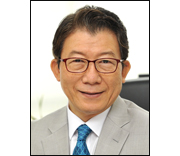-
[March 29. 2016 Korea times] Reciprocity promotes FDIs
- Date : 2016.04.05
- Views : 411
Reciprocity promotes FDIs
 |
By Jeffrey I. Kim
These days the global economy is suffering abnormally low growth. Korean people worry that the power of its growth engines are getting weaker. However, we can find some relief by realizing that the nation's macroeconomic indicators for last year turned out a little better than anticipated. In 2015 Korea's nominal GDP was about $1.4 trillion and ranked 13th in the world. Its CPI inflation was as low as 1.1% and recorded a trade surplus of $30 billion. Korea, the world's 7th largest exporter executed exports of $572.7billion. The trade-GDP ratio is 0.8 which means that Korea's dependence on trade is fairly high relative to most other countries.
Korea's long-term growth potential is expected to be sound and healthy for as long as the government's efforts for regulatory reforms and industrial restructuring continue to be fruitful. Growth potential rests much on trade liberalization and globalization. In 1962 Korea's per capita nominal GDP was a meager $103.9 but this increased to $35,500 in 2015 in terms of purchasing power parity. This performance is largely attributable to its reliance on market competition, protection of private property, and trade liberalization.
According to World Trade Organization (WTO) agreements, any member country should make sure that the same benefit be given to the citizens of the other member countries as is given to its own citizens. However, reality shows that this is not always the case. We often observe that at passport control checkpoints, immigration officers of host nations deliberately keep foreign visitors waiting in a long line while their own citizens swiftly pass through.
However, Korea is a model country in terms of how it treats foreign visitors. According to the Airport Service Quality Survey, Incheon International Airport is the best airport in the world. Korea highly values foreign investors, exporters, and importers, including foreign tourists, so much so that they can get through passport control as swiftly as Korean citizens.
In addition to the national treatment of foreigners, reciprocity often becomes an issue in international trade and investment. The reciprocity principle is based on social psychology or the norm that if someone attends my son's wedding ceremony, I feel obligated to do the same for him in return. The principle of reciprocity is applied in international relations and treaties. Reciprocity has been practiced in the relaxation of travel restrictions and visa requirements, the mutual recognition and enforcement of judgments, the reduction of tariffs and non-tariff barriers, etc. The reciprocity principle is used in the establishment of bilateral as well as multilateral trade agreements.
Reciprocity is exercised in an effort to liberalize international trade and investment. In this context, there are two forms of reciprocity. These are specific and diffuse reciprocity. The principle of specific reciprocity states that favors, benefits, or penalties that are granted by one country to the citizens of another, should be returned. Diffuse reciprocity refers to a situation in which countries do not seek immediate benefits but can act in confidence that cooperative actions between the two parties will be repaid sooner or later and both will be better off in the long run.
Recently a gentleman visited us in the foreign investment ombudsman's office. He represented the association of machinery-manufacturing companies in Germany and came with complaints. He explained that most high-tech machinery and equipment are produced by small-medium size companies in Germany and that they feel regretful about the Korean government's unreasonable non-tariff trade restrictions. According to Korea's regulations on safety certification, German exporters of machinery should get a safety certificate from a third-party inspector. But this will only increase the cost of imports thereby hurting both German producers and Korean consumers.
As I read about this situation, I believe that conformity on legal processes is sufficient. Safety issues shall be dealt with by market surveillance. Should an accident take place, it can be dealt with individually. Above all, Korean machinery exporters can get the same benefit in Germany in terms of not going through third-party inspections by following the principle of reciprocity between Germany and Korea. If we provide the same benefits to German businessmen on the reciprocity basis, we can jointly create further benefits in terms of promoting exports and FDIs for the two countries.
Jeffrey I. Kim is a foreign investment ombudsman, a presidentially appointed troubleshooter for investors and entrepreneurs from overseas. He earned a Ph.D. in economics at the University of Chicago and taught at the University of Colorado, Boulder, and Sungkyunkwan University.
Link : http://koreatimes.co.kr/www/news/opinon/2016/03/137_201321.html










